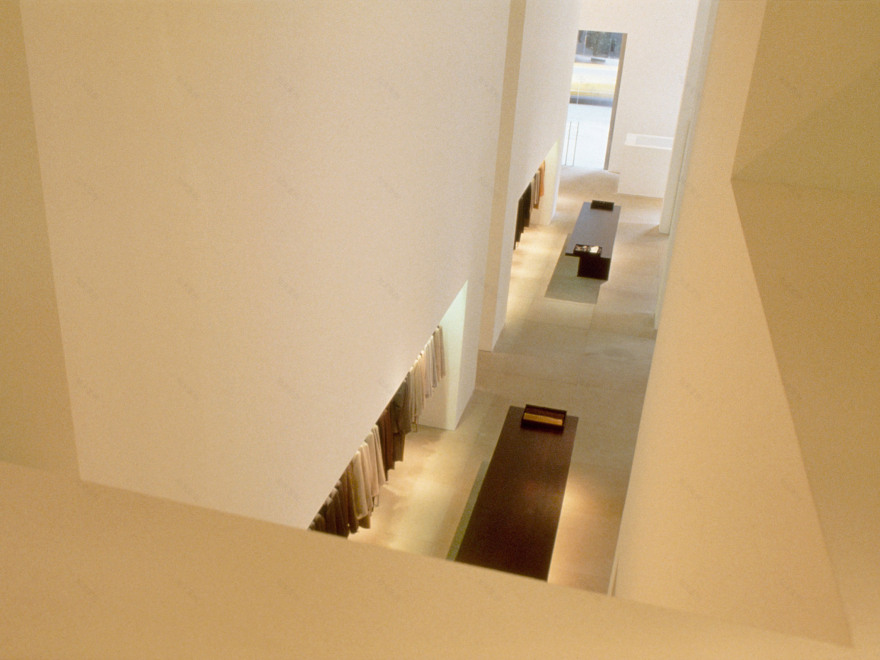查看完整案例


收藏

下载

翻译
The latest episode of Dezeen's Face to Face podcast features architectural designer John Pawson, who recounts his brief spell as a Buddhist monk, how Calvin Klein changed his life and explains how minimalism helps calm his "untidy mind".
Listen to the episode below or subscribe on Apple Podcasts, Spotify and Google Podcasts to catch the whole series.
In the Face to Face series, Dezeen's founder and editor-in-chief Marcus Fairs sits down with leading architects and designers to discuss their lives.
Architectural designer John Pawson features on the latest episode of Dezeen's Face to Face podcast series. Photo is by Gilbert McCarragher
This episode of Face to Face features architectural designer Pawson, who has become celebrated for his minimalist approach to architecture and design, which he says has helped him counter his "untidy and unruly" mind.
"I feel more comfortable without the stuff around or without the clutter. It allows me to think," he said in the interview. "[I have a] very untidy mind, very unruly and, and that's why, you know, it's helped me a lot to have these sorts of spaces."
World tour
Pawson grew up in Halifax in West Yorkshire, England, where his family owned a textile business, but he moved to London to attend Eton, where he admits to not having been a great student.
"I just couldn't knuckle down to studying," he said. "I just couldn't cope with the subjects."
Pawson's home in the Cotswolds, England. Photo is by Gilbert McCarragher
After finishing school, instead of joining the family business, Pawson decided to embark on a world tour that took him to India; Haight-Ashbury in San Francisco during the hippie era; Sydney, where he made friends with actress and singer Liza Minelli; and finally Japan, where he tried to become a Zen Buddhist monk.
"I'd seen a documentary about Aichi," he said. "It was a really beautiful film about the Zen Buddhist monks and I thought, well, this is for me. I lasted four hours."
Meeting Calvin Klein
After giving up on the Buddhist monastery, he travelled to Tokyo where he worked for Shiro Kuramata, one of the most important designers of the 20th century, who convinced him to apply to study architecture at the Architectural Association in London.
Pawson's Wooden Chapel in the Bavarian Forest. Photo is by Felix Friedmann
Despite never finishing his architecture degree, Pawson attended the AA for three years between 1979 and 1981 and was taught by the likes of Zaha Hadid, Rem Koolhaas and Nigel Coates.
"What I learned at the AA was something that I didn't think you could learn and that was to design," he said in the interview.
Pawson's career took off when he designed a flagship store for Calvin Klein in New York. Photo is by Christoph Kicherer
After setting up his own office in London, Pawson's career took off when he was approached by fashion designer Calvin Klein in 1993 to design a flagship store for him in New York.
Related story The design industry is "slow, boring and bullshit" says Hella Jongerius in Dezeen's latest podcast
"He was the most known fashion designer at the time. So it was quite surreal," he explained. "Because of his endorsement, people who weren't quite as adventurous or secure felt much better about hiring me for things."
"I am irrational"
Pawson has since designed large-scale architectural projects such as the Novy Dvur monastery in the Czech Republic and the Design Museum in London, as well as smaller home objects designed for brands such as Wästberg and Tekla.
Pawson's design for Abbey of Our Lady of Novy Dvur in the Czech Republic. Photo is by Hisao Suzuki
Although he is celebrated for the calm minimalism of his projects, Pawson says his work has helped him compensate for his busy mind.
"I am irrational. The calmness is an exterior and I think the work has been brilliant to me because filling the day and working really hard stops you slightly going mad," he explained.
Check out the full Face to Face series
Dezeen's Face to Face podcast series was produced by Dezeen's in-house creative team Dezeen Studio. Past episodes have featured Es Devlin, Thomas Heatherwick and David Chipperfield.
The previous episode of Face to Face featured British designer Tom Dixon who described how a motorcycle crash forced him to abandon a career as a bass guitarist.
Related story "As long as you have attitude, you don't have to be talented" says Tom Dixon in Dezeen's latest podcast
The podcast features original music composed by Japanese designer and sound artist Yuri Suzuki.
Face to Face is sponsored by Twinmotion, the real-time architectural visualisation solution that can create immersive photo and video renders in seconds.
Subscribe to Dezeen's podcasts
You can listen to Face to Face here on Dezeen or subscribe on podcast platforms such as Apple Podcasts, Spotify and Google Podcasts.
客服
消息
收藏
下载
最近









